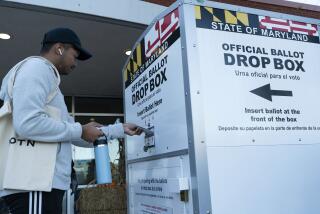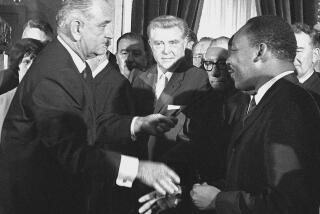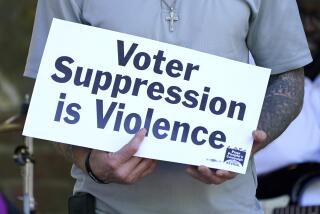Supreme Court strikes down key section of Voting Rights Act
WASHINGTON — The Supreme Court struck down a key part of the historic Voting Rights Act on Tuesday, ruling that Southern states may no longer be forced to seek federal approval before making changes in their election laws.
The ruling came on a 5-4 vote, with Chief Justice John G. Roberts Jr. speaking for the court.
Roberts said the 1965 law had been a “resounding success” and has ensured that blacks now register and vote at the same rate as whites.
But he said it was no longer fair or rational to subject these states and municipalities to special scrutiny based on a formula that is more than 40 years old.
“States must beseech the federal government for permission to implement laws that they would otherwise have a right to enact and execute on their own,” he wrote. This conflicts with the principle that all the states enjoy “equal sovereignty” and cannot be subjected to different federal laws, he said.
PHOTOS: 2013’s memorable political moments
“Our country has changed in the last 50 years,” the chief justice said. He said that Congress needs to “speak to current conditions.”
As it currently stand, nine states are covered by the law based on voting data from the 1960s and early 1970s.
Justices Antonin Scalia, Anthony Kennedy, Clarence Thomas and Samuel A. Alito Jr. joined with the chief justice.
The decision may have an immediate impact. Texas has been fighting federal courts over its voter ID law and plans to redistrict its congressional districts. Those state actions were halted under the part of the law struck down Tuesday.
The decision leaves open the possibility that Congress could adopt a new formula to target states or municipalities for special scrutiny.
The decision leaves intact the rest of the Voting Rights Act, which makes it illegal to adopt or enforce laws that have a discriminatory effect on minority voters. But civil rights advocates say the provision struck down Tuesday was still needed because it stopped discriminatory measures before they could take effect.
Justice Ruth Bader Ginsburg spoke for the four dissenters. She said the court had made an “egregious” error by striking down a law that had been extended in 2006 by a near unanimous vote in Congress.
Follow Politics Now on Twitter and Facebook
More to Read
Get the L.A. Times Politics newsletter
Deeply reported insights into legislation, politics and policy from Sacramento, Washington and beyond. In your inbox three times per week.
You may occasionally receive promotional content from the Los Angeles Times.







